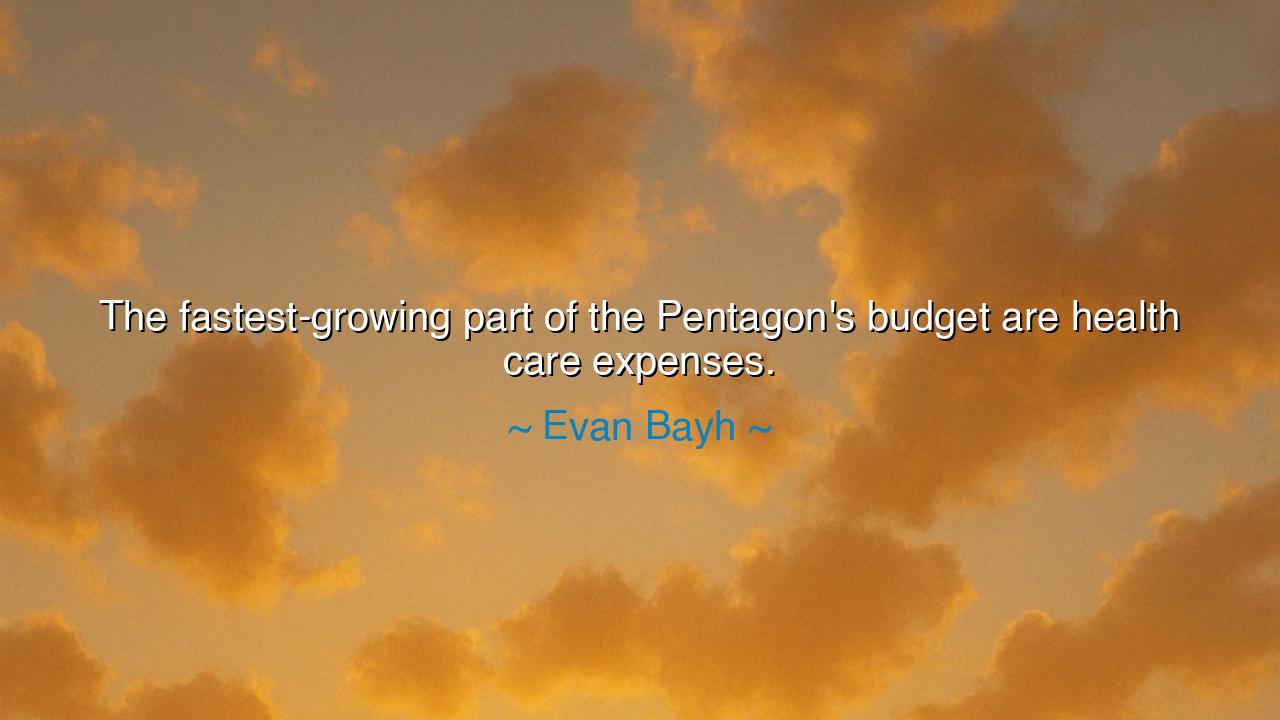
The fastest-growing part of the Pentagon's budget are health care






In the solemn words of Evan Bayh, there lies a revelation of irony and consequence: “The fastest-growing part of the Pentagon’s budget are health care expenses.” These words do not merely recount numbers upon parchment or ledgers; they speak of a deeper imbalance within the heart of a great nation. They call us to ponder how even the mightiest of empires, armed with steel and fire, must eventually bow before the frailties of the flesh. For what good is power, if those who wield it are consumed by their wounds? What meaning has conquest, if the warriors who protect the realm cannot themselves find healing?
In the age of the ancients, when soldiers marched under banners of kings and gods, the cost of war was paid in blood, and its echo lingered in the cries of the wounded. Yet even then, the wisest rulers understood that the true strength of an army lay not only in its weapons but in the well-being of its soldiers. The words of Evan Bayh remind us that health care, once seen as a mercy extended to the weary, has now become a vast and growing burden — a mirror reflecting the weariness of a people stretched too far, fighting too long, and caring too little for the deeper wounds that no weapon can heal.
The Pentagon, symbol of defense and power, was built as a fortress of strategy, a monument to protection and might. But as Bayh reveals, its greatest struggle now lies not on distant battlefields, but within its own walls — the battle to sustain the bodies and minds of those who have fought for it. Behind every statistic lies a veteran scarred by war, a family torn by trauma, a life forever changed. The fastest-growing cost is not merely measured in dollars, but in the invisible toll of human suffering, the quiet despair that follows glory, and the price of neglecting the heart in favor of the sword.
Consider the story of the Roman legions, the most disciplined and formidable soldiers of the ancient world. They conquered continents and bent empires to their will, yet even Rome — mighty and vast — learned the cost of neglecting those who bore its banner. In the empire’s twilight, veterans returned from endless wars, broken in body and disillusioned in spirit. Promised care and land, they received instead bureaucracy and delay. Many turned against the very system they once defended. And so, Rome fell not only from the assault of its enemies, but from the corrosion of its own humanity. The same truth echoes today: no nation can stand long if it forgets to care for those who stand in its defense.
Evan Bayh’s words are not a condemnation, but a warning wrapped in wisdom. When a nation’s defense becomes more costly to its own people than the wars it fights, the scales of purpose have tipped. When the cost of healing surpasses the cost of destruction, something sacred has been lost. The issue is not merely financial — it is moral. For health care should be a symbol of gratitude and justice, not a burden that drains the treasury while the spirit of compassion runs dry.
Let us then learn from the past and from the wisdom of this quote: the strength of a nation lies not in its weapons, but in the wellness of its people. The soldier, the citizen, the healer — all are threads in the same tapestry. To care for one is to preserve the whole. If we wish to build a world that endures, we must invest not only in the art of war, but in the art of healing. Every resource spent on health, on restoration, on humanity, is a shield far greater than any forged from steel.
The lesson for our time is this: let us not glorify might while neglecting mercy. Let us not build empires of defense while our defenders suffer in silence. The rising tide of health care costs in the halls of the Pentagon is not merely a bureaucratic dilemma — it is a call to conscience. To answer it, we must build systems that honor sacrifice with support, that replace waste with wisdom, and that hold human well-being as the truest measure of national strength.
For in the end, history will not remember the missiles we built or the wars we won. It will remember how we treated those who bore the weight of our safety — how we healed them, honored them, and learned from their pain. And perhaps then, the growing cost that Evan Bayh warned of will not be a sign of decay, but a sign of awakening — the moment when power and compassion, at last, march hand in hand.






AAdministratorAdministrator
Welcome, honored guests. Please leave a comment, we will respond soon